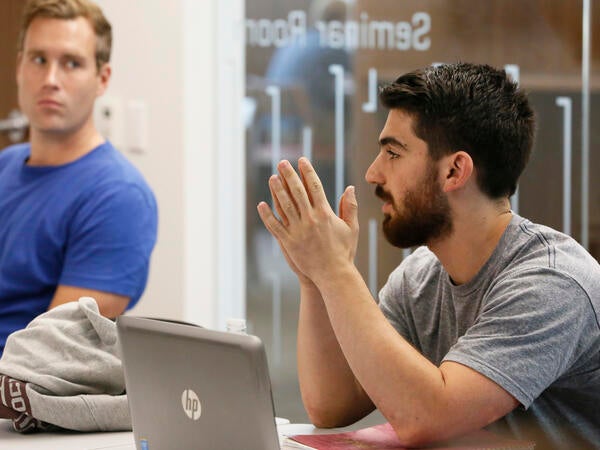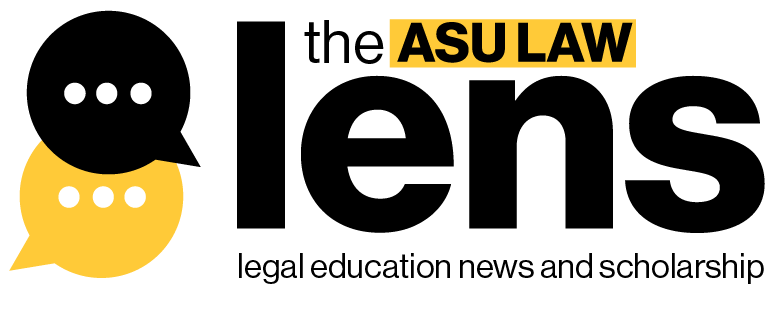
Inside ASU Law’s approach to building the part-time, online modality to its JD program
The Sandra Day O’Connor College of Law at Arizona State University recently opened applications for its new part-time, fully online Juris Doctor program, designed to offer the same rigorous, high-quality education as its on-campus counterpart.
Related Story: ASU Law to offer its JD part-time and online, addressing critical legal shortages and public service
Behind the scenes, faculty are taking a detailed and intentional approach to course design. Kimberly Holst, clinical professor of law, who is helping develop a legal writing course, said it’s been a long, thoughtful process to build everything from scratch.
“There was a lot of legwork in getting the program approved and set up from the administrative perspective,” Holst said. “Once we were approved and the curriculum was set, the faculty for the first cohort were selected and that's where my involvement increased.”
Working closely with instructional designers at ASU EdPlus, the team is reviewing every part of each course, from lectures to assignments, to make sure everything lines up with course and module objectives.
“We can't take anything we do for granted; we are looking at why things work and not just relying on the fact that they work for our ground classes,” Holst said.
Rather than simply shifting existing in-person classes online, faculty are rethinking how each activity works in a digital format.
“They can't replicate the ground courses — but I don't think they should,” Holst said. “It's important to consider how the modality impacts the effectiveness of an exercise or lecture and how we might take an alternative approach to achieve the same objectives.”
Throughout the process, the entire team is also being selective about which technologies they use to enhance learning without overwhelming students.
The effort is being led by Angela Banks, vice dean and Charles J. Merriam Distinguished professor of law, with Mary Loder, manager of professional development and training, serving as the lead instructional designer at EdPlus. Behind the scenes, more than a dozen EdPlus team members are contributing to course and program design, which includes the development of custom AI tools to support learning. The first year teaching faculty, Holst, Khaled Beydoun, associate professor of law, Joel Friedman, professor of law, Ben McJunkin, associate professor of law and Academy for Justice associate deputy director, Andrew Carter, clinical professor of law, Beth DiFelice, law library assistant dean and librarian and Michele Feeney, Trial Advocacy Program director, are each developing courses in their respective subject areas.
“One of the things that I am staying aware of is not overloading students with different forms of technology,” Holst said.
For Holst, who once commuted 75 miles each way to attend law school while working part-time, the work is personal. She knows firsthand how valuable an option like this will be for students balancing work, family or caregiving responsibilities.
“Many of the students likely to benefit from this option are short on one particular resource — time,” she said. “An online option offers flexibility and allows the student to use time productively rather than using it on a long commute or trying to organize support to cover their other responsibilities.”
As faculty finalize content, the next phase will include building the courses into ASU’s online platform, Canvas and recording video lectures and other interactive materials. Each course will go through a final review to ensure all elements support learning goals and create a dynamic experience for online students.
“Once we have all of the pieces in place, EdPlus will help us review all aspects of the course to make sure we've included the content and designed the course in a way that will support our course objectives,” Holst said.
Even with all the technology and careful planning, one of the most rewarding parts of this process has been stepping back to think more intentionally about how students learn and how course design shapes that experience, according to Holst. In some cases, the work done for the JD part-time, online is already influencing how faculty approach their in-person courses as well.
“One of the benefits from working on this course has been articulating these goals and sorting out why exercises work — I'll take this intentionality back to my ground course as well,” Holst said.
For more information on the initiative, visit https://law.asu.edu/part-time-online-jd.
Written by Crystal Jimenez
For the media
Legal studies research
Legal experts list
Media resources
Faculty directory
Staff directory
For all press and media inquiries, please contact: Kourtney Kelley, Assistant Director of Communications
law.media@asu.edu
480-965-6197
